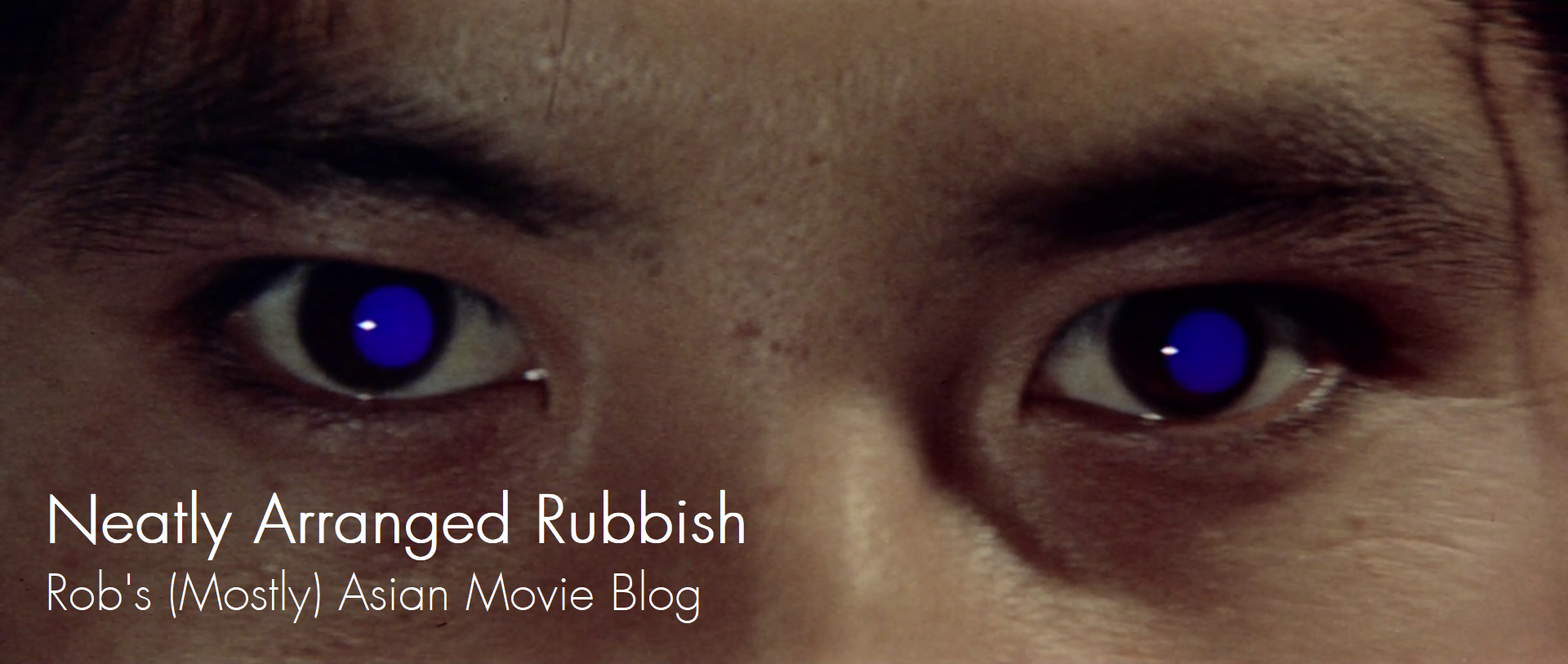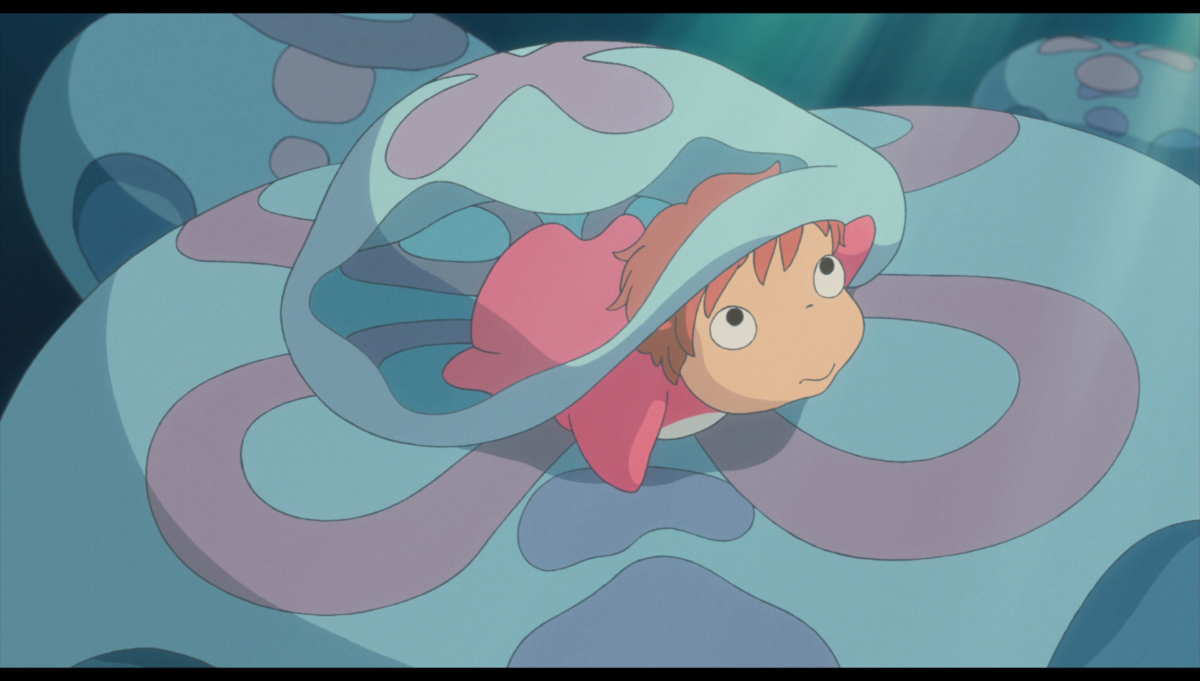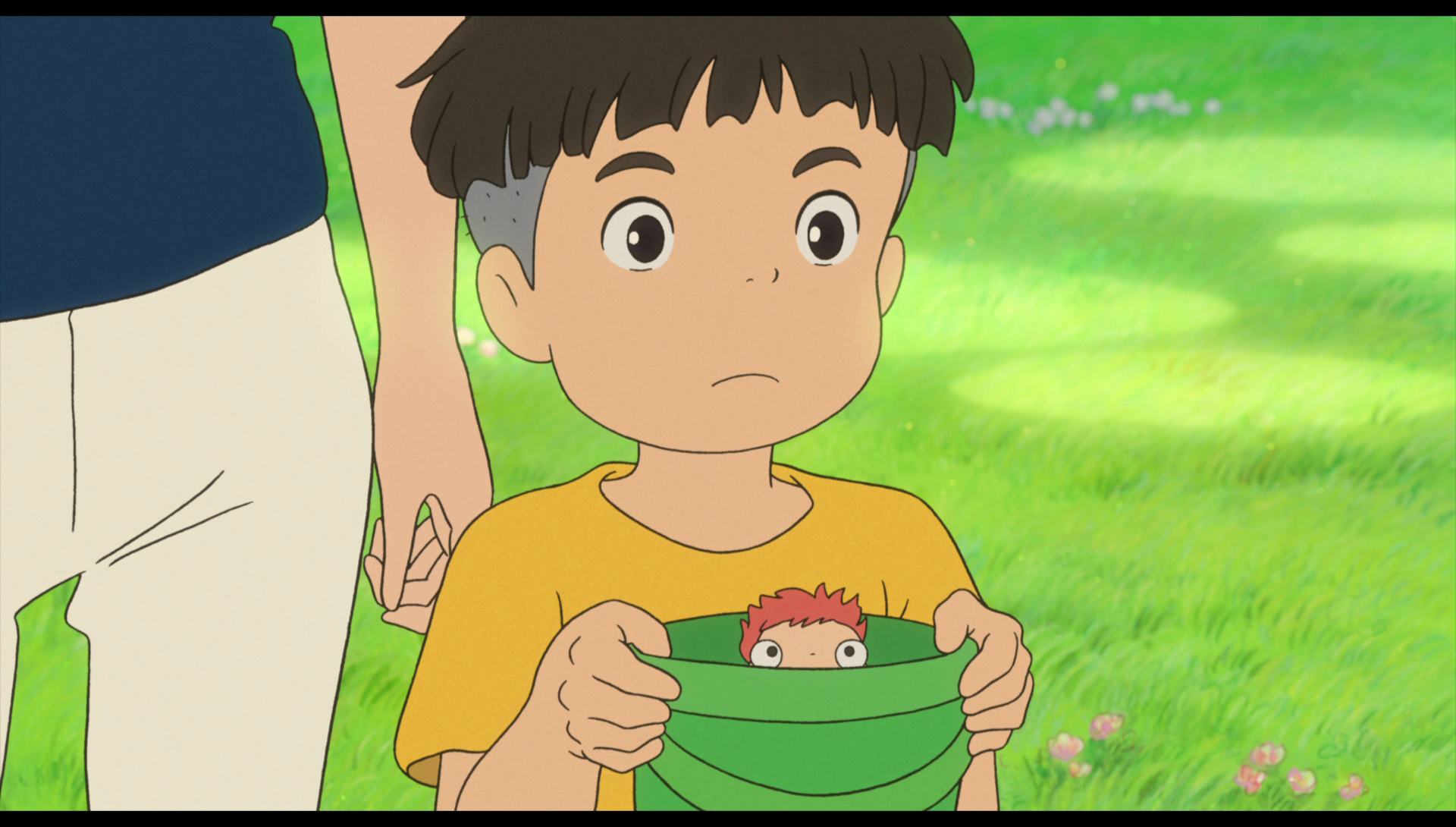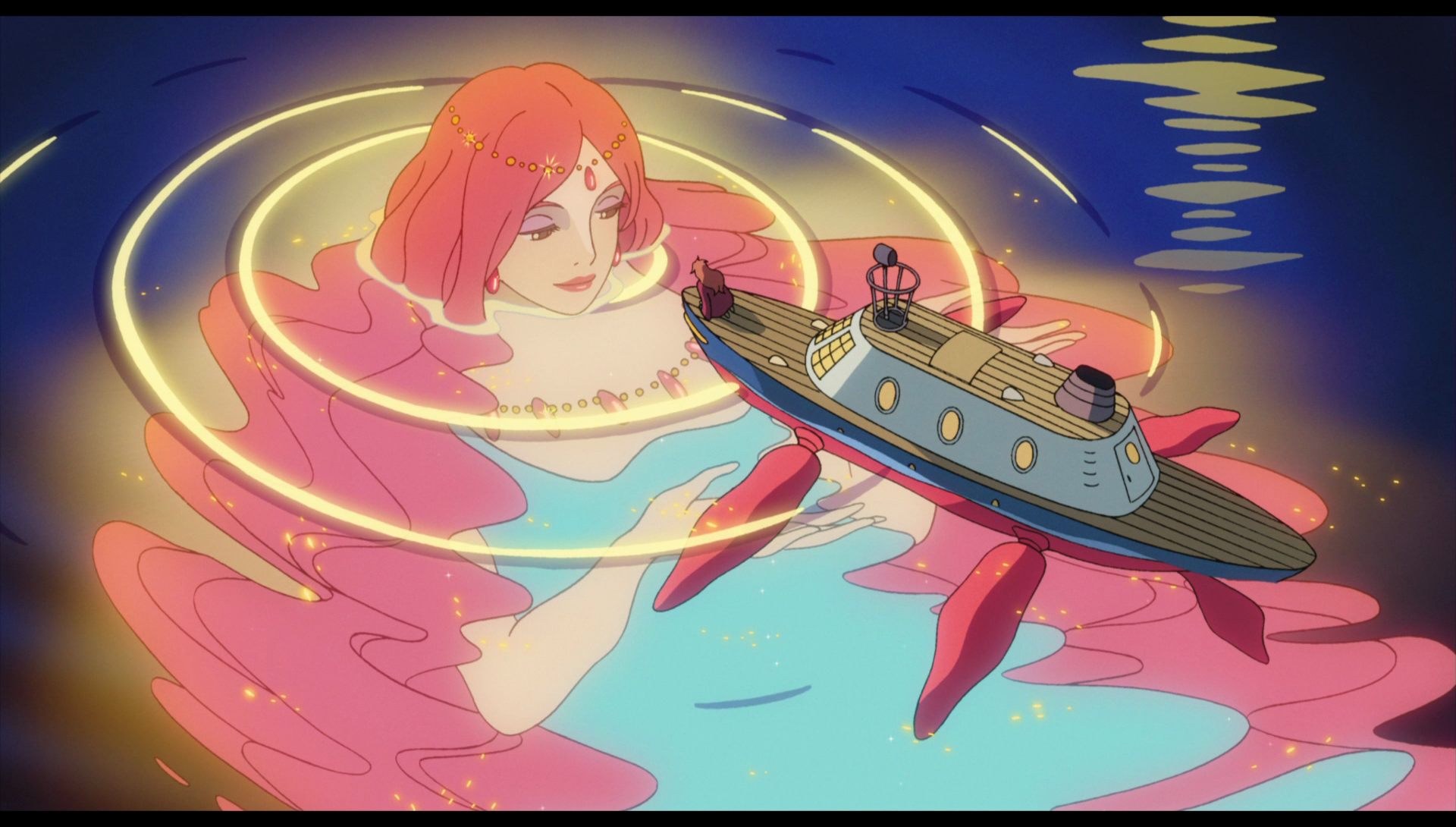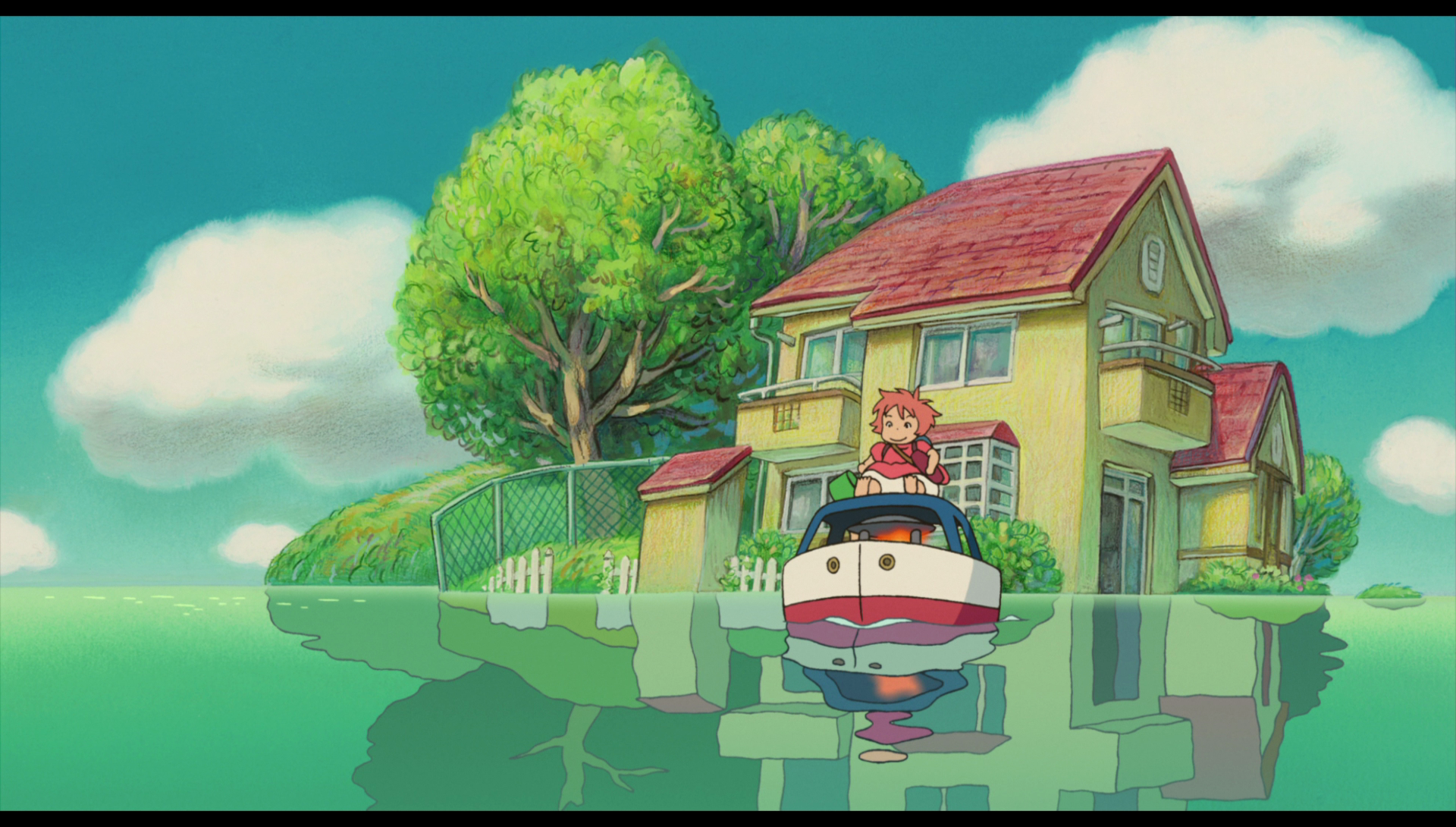Last Updated on October 8, 2020 by rob
An insatiably curious goldfish princess named Ponyo falls in love with Sosuke, the five-year old boy who saves her after she ends up washed ashore and trapped in a bottle. But Ponyo’s love for Sosuke and subsequent transformation from fish to human alarms her wizard father Fujimoto (who despises humans for their environmental vandalism) and throws nature so terrifyingly out of balance it threatens to destroy the world.
One of the things that’s always struck me about the great artists – it doesn’t matter what the field of artistic endeavour – is the way their style often becomes simpler as they age. It’s as if the artist’s collective experience results in an instinctive focus in which the irrelevant, the ornate and the extraneous is ruthlessly pruned away until only the essentials remain. I was reminded of this watching the 68-year old Hayao Miyazaki’s Ponyo. It’s not just the lovingly hand-drawn animation, which has a simplicity of style subtly different to earlier Studio Ghibli works, it’s there in one of brilliant composer Joe Hsiashi’s best ever scores, a basic five line melody that overwhelmingly evokes the innocence and wonder with which a child perceives the world and it’s there in Ponyo and Sosuke – two characters whose reaction to events is so driven by instinct and feeling, whose love for each other is so pure, it can literally bridge the gulf between worlds.
And it’s most certainly evident in the story and plot (there’s no villain here as such) which avoids unnecessary complexity and all that hip cultural referencing that’s such a characteristic of Pixar in favour of an open and direct emotional truthfulness that’s completely disarming. The love affair between Ponyo and Sosuke aside, this is a subtle and poignant portrait of struggling parents. There are two pairs here and in each, one is away, leaving the other – Fujimoto in Ponyo’s case and Lisa in Sosuke’s – to care for their child alone. To say the least, it’s not easy for them and while both parents love their children there’s a serious point made about how Fujimoto and Lisa need to shed their ‘sophisticated’ adult ways and trust their instincts in the same way Ponyo and Sosuke do. And I use that word ‘instinct’ very specifically Miyazaki isn’t saying that we should all just be infantile.
This is a much more intelligent and perceptive film than the ‘Ponyo isn’t as dark as Princess Mononoke so it isn’t as deep’ crowd like to claim. In fact I recall similar comments being lobbed at Totoro when that first came out but just as over the years that has grown in people’s estimation to become their favourite Ghibli film I feel certain that in years to come Ponyo will follow the same path. There are tremendous sequences here, from the spectacular opening in which the once human Fujimoto (Liam Neeson) is shown creating prehistoric life with his magic elixir while an inquisitive Ponyo makes the journey to the ocean surface by riding on the top of a jellyfish, to the thrilling arrival of Ponyo’s ocean goddess mother Gran Mamare (Cate Blanchett).
Then there’s Ponyo running on the backs of gigantic fish during a tsunami driven typhoon (in part a homage to Wagner’s Ride of the Valkyries, Ponyo’s original name, so we learn, was Brunhilde), all of which rank with Chihiro’s train journey to Swamp Bottom in Spirited Away as the best thing Miyazaki has ever done. Best of all though is the almost inexpressible beauty with which Miyazaki channels that childlike sense of wonder through ever frame of this masterpiece. Even grumpy middle-aged types like me were fighting back the tears at the joyous sight of Ponyo in fish form expressing her love for Sosuke by doing back flips and spins in the little green pail he keeps her in, or her adorable sisters (dozens of squeaky-voiced mini-sized Ponyo’s) flocking to assist their sibling whenever danger threatens.
And a voyage through a flooded town in which the children gaze down from a toy boat Ponyo has magically enlarged at fish from the Devonian era who swim down the roads like aquatic traffic is an extraordinary feat of imagination. Then there’s the uncanny accuracy with which the children’s movements are depicted (watch the moment where Sosuke steps through the door into the old folks home or where Ponyo wearily picks up a toy boat and pail). These quiet moments are so acutely observed they carry an emotional impact that hits you for six and reminds you of just what animation is capable of in the hands of a team of geniuses. In short, Ponyo is a brilliant film and my favourite Miyazaki. There’s even a ridiculously catchy theme tune! All together now, ‘Ponyo, Ponyo, Ponyo…fishy in the sea…She’s a little girl…with a round tum-my..!’
